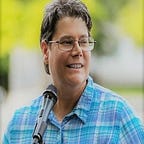The Lost Sheep
I served as a Metro Nashville police officer for 12 years before working for area nonprofits as a Victims of Crime Coordinator, support group facilitator and advocate. During that time I was often asked why the church doesn’t talk about sexual violence. I’ve never had an answer. But I think the honorable John Lewis made an excellent case for talking about injustices when he said “The civil rights movement was based on faith and we saw it as an extension of our faith…as doing the work of the Almighty.” Even though the roots of the movement may be different, I feel the same about the metoo movement’s goal of shedding light on the epidemic of sexual violence, and bringing about justice.
We’re all children of God, beloved by him and other than murder, I personally can’t think of anything more offensive to God than having the sanctity of one of His children’s bodies being violently violated. A few moments ago Nancy reminded us we are chosen as witnesses to God’s dream of justice and joy. As God’s children, we’re called to help bring that dream alive — to go out and find the lost sheep, the wondering child lost in despair and pain, and to rejoice and celebrate when they return home and begin to heal. Rachel Held Evans may have said it best when she said “The church is called to the slow and difficult work of healing.” That’s why I believe there’s no better place than our faith communities to talk about injustices such as sexual violence, or a better place to find healing and hope than with our church families. That’s why I’m here today — to share how God’s healing hand can be found in the most unexpected places, and how talking about injustices can help lost sheep find their way home.
In June 2017, I stopped at a truck stop to use the restroom. I’d maybe gotten 7–10 feet from my car when I felt someone grab me from behind and shove me against the hood of my car. Now I left the police department in 2000, so it had been a while since I’d used defensive tactics, but I assumed age and lack of practice wouldn’t keep me from defending myself if needed. I was wrong. After he sexually assaulted me, I got as far away as I could until I felt relatively safe and started processing what had just happened. As a former officer, I felt I should have been able to fight him off, I felt I should have been more aware or somehow sensed something was going to happen. Intellectually I knew the only person to blame was my attacker, but like many victims, I blamed myself. I was also terrified others would blame me or worse yet, not believe me. It’d never occurred to me a police officer could be raped. Police officers protect people, they keep people from being raped, they aren’t raped themselves. So, if I didn’t believe it could happen, why would anyone else.
I decided to keep it a secret, making excuses for black eye, bruises on wrists, and I refused to talk even acknowledge that it happened. But ignoring it didn’t make it go away. In fact, it made me quickly spiral into a deep depression, praying every night God would allow me to die in my sleep and crying every morning when I saw the sun rise. After 3 months or so I was convinced God wasn’t going to answer my prayers and knew I had to do something different. That’s when I decided exactly how I would end my life.
I started writing goodbye letters and I got through all of them just fine, until the very last one. I just couldn’t find the right words, and the harder I tried to find the words, the more stubborn the words became. So, I finally laid the paper down thinking if I took a break, the words would come. Two or three minutes later I realized I was mindlessly scrolling through my Facebook feed. I don’t remember picking up my phone or logging into Facebook, but there I was, and there was this hashtag. I kept seeing friend after friend posting #metoo, but I had no clue what it meant — I hadn’t been on Facebook or even watched tv in day. Once I figured is out, it struck me how friends had been through something at least somewhat similar to me and found the courage to keep going.
I was a lost sheep and felt like I was damaged beyond repair. But God found me and brought me back by giving me the glimmer of hope I so desperately needed at the exact time I needed it most. He gave me friends, and strangers, brave enough to say metoo. As I stared at post after post, I decided I would try to keep going too — and on days when I really struggle I remind myself that God put those people in front of me for a reason. As Jeremiah 29:11 reminds us, God knew the plans he had for me, and his plan was to provide me the opportunity to give meaning and purpose to my pain.
No matter how lost we are, no matter how broken and hopeless we may feel, we need to remember God never abandons us, and all of us are worthy of being celebrated.
